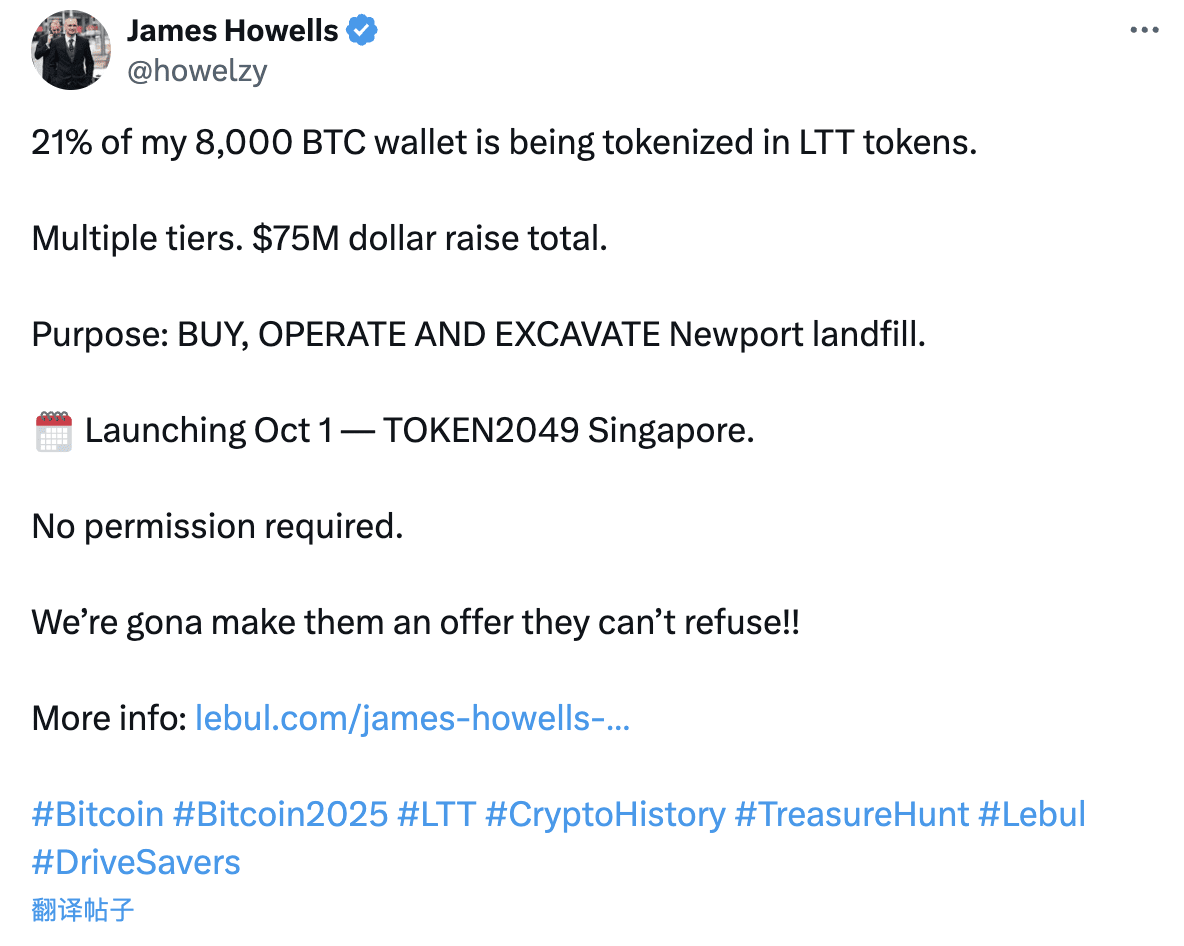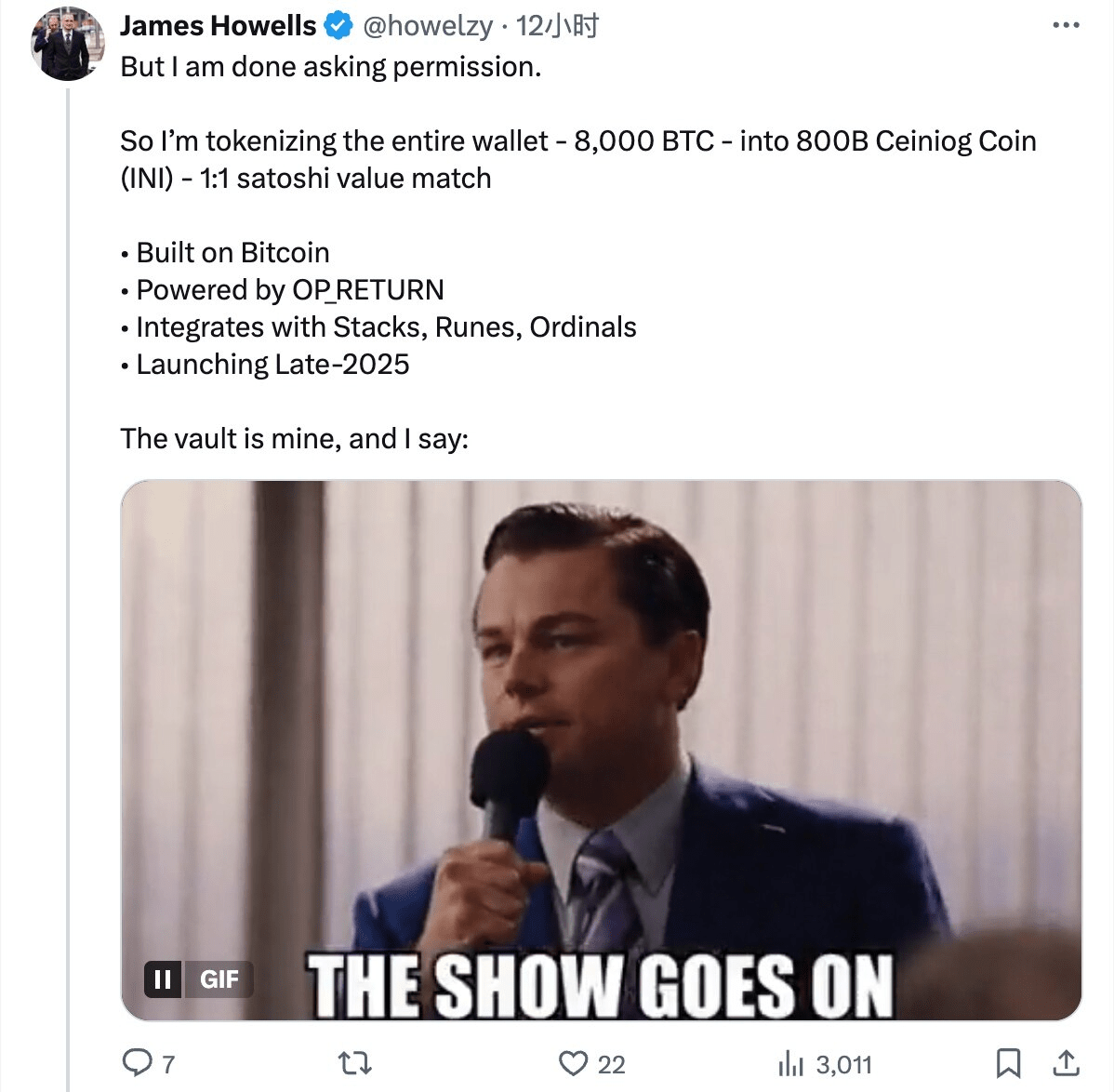Written by: Azuma, Odaily Planet Daily
After a long search of 12 years, British man James Howells has decided to abandon the search for a hard drive that contains 8000 BTC (valued at about $920 million based on a price of $115,000).
Odaily Planet Daily Note: Regarding the specific quantity of lost BTC, while early UK media reported it as 7500 coins, later media reports and Howells' descriptions indicated it was 8000 coins, so this article will use that figure.
Accidentally lost 8000 BTC
James Howells was born in the 1980s in Newport, Wales. Influenced by his mother, who worked in microchip manufacturing, Howells was exposed to computer technology at an early age. He became a frequent internet user as a teenager, started assembling computers at the age of 13, and eventually became a computer engineer.

As early as the end of 2008, Howells was exposed to knowledge about bitcoin. On February 15, 2009, Howells began mining bitcoin using a Dell XPS laptop—(The Daily Telegraph) identified him as one of the earliest miners in the bitcoin network, while (The New Yorker) noted that when he participated, there were only five miners on the entire network.
However, Howells' mining work did not last long because his girlfriend kept complaining about the noise and heat from the laptop while mining... In 2010, Howells accidentally spilled lemonade on the computer, damaging it. He then disassembled it and took out the parts, most of which were thrown away or sold, while the hard drive containing the 8000 BTC private key information was left forgotten in a drawer.
Between June 20 and August 10, 2013, Howells mistakenly discarded the hard drive as waste. Howells later stated that it was his ex-girlfriend Hafina Eddy-Evans who sent the trash containing the hard drive to the landfill, but Eddy-Evans claimed that Howells asked her to help dispose of these waste items, denying any wrongdoing, while Howells stated that he believed subconsciously that she should be responsible for it.
Howells recalled later: 'I wasn’t really paying attention to bitcoin at that time because I was distracted. After that, I had a few children and started renovating my house, so I completely forgot about bitcoin until it appeared in the news again.'
In November 2013, (The Guardian) reported speculating that the hard drive was buried about 0.9 to 1.5 meters below the Newport Docksway landfill, and Howells admitted during that interview that these BTC might be permanently lost.
The Newport City Council subsequently pointed out that the hard drive may be buried under 25,000 cubic meters (approximately 110,000 to 200,000 tons) of waste. A former landfill manager confirmed it was located in a 15,000-ton landfill area named Cell-2 (the accumulation area from August to November 2013), with a total landfill volume of 1.4 million tons.
Coin prices rise, search obstructed
As BTC prices continued to soar, Howells began to repeatedly attempt to search for the hard drive, but was denied multiple times by the local council for various reasons.
In December 2017, the Newport City Council rejected Howells' request to search the landfill, citing costs, environmental impact, equipment corrosion risks, and the potential for illegal activities related to a 'gold rush'. In January 2021, Howells proposed donating 25% of the bitcoins (valued at £52.5 million at the time) to the local 316,000 residents (around £175 per person), but the council again denied the request, claiming it violated licensing regulations.
A spokesperson for Newport City Council stated in an interview with CNN that local government departments have received multiple inquiries since 2013 about assisting in recovering the hard drive that allegedly contained bitcoins. The council did not refuse this proposal but was not permitted to excavate the site—'The council has repeatedly told Mr. Howells that according to our licensing regulations, it is impossible to excavate the landfill, and excavation itself would have a significant environmental impact on the surrounding area. The costs of excavating the landfill, storing, and processing waste could reach millions of pounds, and there is no guarantee that the hard drive would be found or that it would still function.'
However, at this time, Howells insisted that the hard drive could still function normally under the protective casing and the corrosion-resistant cobalt layer of the glass platters—after all, with the value of these BTC skyrocketing, no one would easily give up such a large fortune.
To obtain the council's landfill access permit, Howells developed several detailed plans to address the council's concerns. During this time, a hedge fund expressed interest in funding Howells (with a proposed 50% profit sharing), planning to locate the hard drive using municipal waste records and to have it processed by a professional data recovery team. Howells estimated a budget of £5 million for the excavation work, which was expected to take 9 to 12 months. In August 2022, with assistance from some venture capital funds (which would take a 30% profit share), Howells upgraded the search plan to use AI robotic arms to scan waste, deploy drones and Boston Dynamics robotic dogs for security, and form an environmental team, with the budget increased to £10-11 million.
To gain community support and secure the council's search permit, Howells also proposed to use the proceeds to develop a community-owned mining facility at the landfill, which would utilize solar or wind energy.
On September 6, 2023, after prolonged unsuccessful applications, Howells instructed his legal team to send an open letter to the Newport City Council, declaring that he would initiate a lawsuit. The open letter requested the city to halt landfill construction while also seeking £446 million in compensation and asking for a judicial review of the council's decision to deny access to the site. Two months later, his legal team sent another letter to the council, requesting site access before resorting to the courts.
As of October 2024, the bitcoin estimated value inside the hard drive reached $750 million. Howells eventually sued the council for £495 million in compensation, but the council argued that according to waste disposal regulations, ownership of the hard drive belonged to the municipality.
On January 9, 2025, the judge ultimately ruled to dismiss Howells' lawsuit, stating that the case 'lacked reasonable grounds' and 'had no chance of success'. Howells expressed to the media that he was 'extremely disappointed', but also revealed his new plan—issuing a new cryptocurrency anchored to the bitcoins that could not be recovered.
Search yield no results, explore alternative paths
Due to the inability to obtain access permission from the council, Howells ultimately chose to abandon the search but opted for another potential path.
As early as May of this year, Howells disclosed on his personal X that he intended to tokenize 21% of the 8000 BTC, aiming to launch it during TOKEN 2049 Singapore on October 1, planning to raise $75 million... However, in the following months, Howells did not mention this matter again on his personal social media channels, indicating that the plan may have already fallen through—after all, everyone knows that the BTC is unlikely to be recovered, and seeking to raise $75 million looks somewhat unseemly.

This morning, Howells disclosed a new plan regarding the tokenization of the BTC, intending to issue 80 billion Ceiniog Coins (INI). This token aims to be proposed by the end of the year, built on the bitcoin network, supported by OP_RETURN, integrated with Stacks, Runes, and Ordinals, with each INI pegged to the value of 1 satoshi of the bitcoins.

Howells finally released a passionate statement: 'To all the senior and outstanding gatekeepers who have obstructed me for over a decade: You can lock the doors! You can control the courts! But you cannot stop the blockchain! Cryptocurrency has won!'
However, considering that the hard drive is still untraceable, even if Howells describes it beautifully, INI does not actually have any asset backing, leaving the future of the plan in question.
Cryptocurrency may prevail, but Howells' token issuance is unlikely to succeed.

